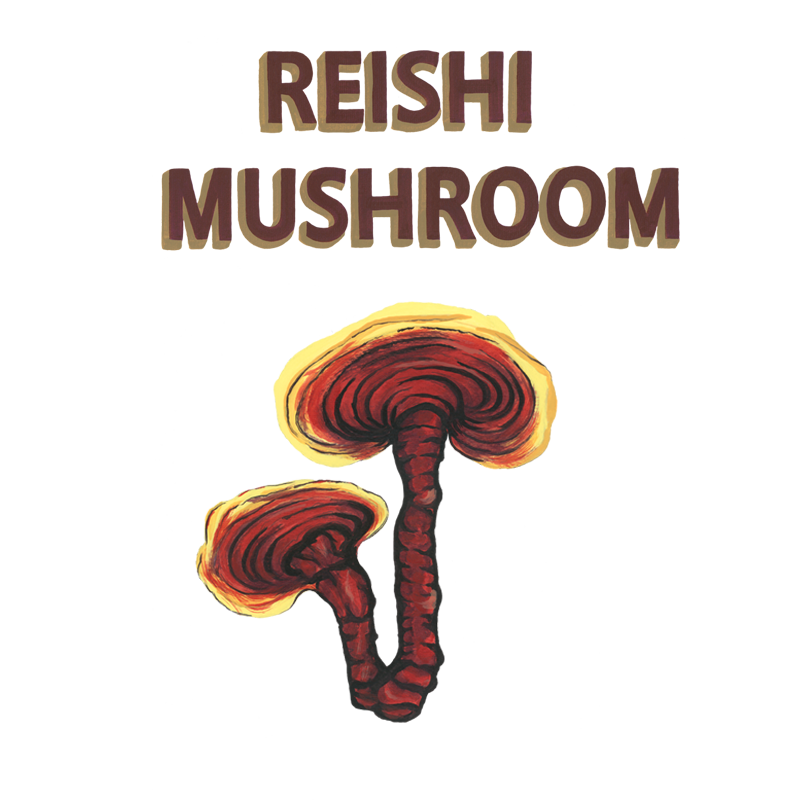Reishi Mushroom
Ganoderma lingzhi, Mushroom of Immortality

Main Actions
- Antidepressant
- Immune system modulator
Other Actions
- Antioxidant
- Assists in the reduction of blood pressure levels
- Potential anti-cancer agent
- Supports overall metabolism
Description
For more than 2,000 years, the Reishi mushroom (Ganoderma lucidum) has been used in Traditional Chinese Medicine (TCM), where it is known as Lingzhi. The earliest written record of the use of Reishi as a medicine comes from the Han dynasty, dating back to the 3rd century, CE. Also known as the “Mushroom of Immortality,” and the “elixir of life,” it grows on downed hardwoods like Oak, Elm or Maple in warmer regions. A large mushroom with a shiny, swirled red-orange surface, it can be found growing in China, Southern Pacific regions, and in the southern parts of Europe and the United States.
Recent studies indicate that the primary active components of Reishi appear to be alpha- and beta-glucans and triterpenes, which provide immunological stimulation that can have antioxidant, antiviral, blood sugar and blood pressure lowering, and potentially, anti-cancer qualities.
In TCM, immune modulation is thought to improve the body’s resistance to disease. This immunomodulation appears to be dependent on the alpha- and beta-glucans that stimulate the production of cellular messengers (cytokines) from immune cells—these cytokines in turn enhance the production of various other modulatory cellular messengers. ,
More recently, in preliminary clinical (human) studies, Reishi has shown promise in reducing the symptoms of depression and anxiety. In one study, where depression was not an area of intended focus, it found that in breast cancer patients, there were significant improvements in both anxiety and depression after using Reishi for 4 weeks.
According to a recent review of the medicinal potential for Reishi, “the pharmacological potential was observed in diabetes, inflammation, epilepsy, neurodegeneration, cancer, anxiety, sedation, cardiac diseases, depression, hepatic diseases, and immune disorders; however, most of the studies are preclinical with a number of drawbacks.” In other words, despite the fact that Reishi mushroom offers a wide range of benefits that have been documented for over 2,000 years, the scientific community has yet to commit the resources necessary to support what cultural, historical, and ancestral knowledge confirms.
The Reishi mushroom’s body and mycelium (network of threads) are utilized whole, or dried and used as powders and extracts.
REFERENCES
1 Soccol CR, Bissoqui LY, Rodrigues C, Rubel R, Sella SR, Leifa F, de Souza Vandenberghe LP, Soccol VT. Pharmacological properties of biocompounds from spores of the lingzhi or Reishi medicinal mushroom Ganoderma lucidum (Agaricomycetes): a review. International journal of medicinal mushrooms. 2016;18(9). https://www.dl.begellhouse.com/journals/708ae68d64b17c52,2e89624a4c27b9d4,361064a736da898a.html
2 Chakraborty N, Banerjee A, Sarkar A, Ghosh S, Acharya K. Mushroom polysaccharides: A potent immune-modulator. Biointerface Research in Applied Chemistry. 2021;11:8915-30. https://biointerfaceresearch.com/wp-content/uploads/2020/08/20695837112.89158930.pdf
3 Murphy EA, Davis JM, Carmichael MD. Immune modulating effects of β-glucan. Current Opinion in Clinical Nutrition & Metabolic Care. 2010 Nov 1;13(6):656-61. http://www.medicinabiomolecular.com.br/biblioteca/pdfs/Biomolecular/efeitos-imunomoduladores-da-beta-glucana.PDF
4 Pazzi F, Adsuar JC, Domínguez-Muñoz FJ, García-Gordillo MA, Gusi N, Collado-Mateo D. Ganoderma lucidum effects on mood and health-related quality of life in women with fibromyalgia. InHealthcare 2020 Dec (Vol. 8, No. 4, p. 520). Multidisciplinary Digital Publishing Institute. https://www.mdpi.com/907266
5 Zhao H, Zhang Q, Zhao L, Huang X, Wang J, Kang X. Spore Powder of Ganoderma lucidum Improves Cancer-Related Fatigue in Breast Cancer Patients Undergoing Endocrine Therapy: A Pilot Clinical Trial. Evid Based Complement Alternat Med. 2012;2012:809614. doi: 10.1155/2012/809614. Epub 2011 Dec 10. PMID: 22203880; PMCID: PMC3236089. https://pubmed.ncbi.nlm.nih.gov/22203880/
6 Ahmad R, Riaz M, Khan A, Aljamea A, Algheryafi M, Sewaket D, Alqathama A. Ganoderma lucidum (Reishi) an edible mushroom; a comprehensive and critical review of its nutritional, cosmeceutical, mycochemical, pharmacological, clinical, and toxicological properties. Phytotherapy Research. 2021 Aug 19. https://onlinelibrary.wiley.com/doi/abs/10.1002/ptr.7215
